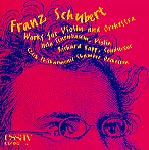Interestingly, this program’s most engaging and idiomatically convincing work is the one not initially conceived for soloist and orchestra–the Rondo in B minor D. 895, which conductor Richard Kapp handily orchestrated from its original violin/piano version. One reason for its appeal may lie in the fact that it’s a later work–written in 1826 (the other works here are from 10 years earlier)–that combines greater conceptual maturity with a more experienced flair for dramatic execution. Mela Tenenbaum, a mature and eloquent artist in her own right, takes charge of this substantial and challenging piece–a work that doesn’t shy away from virtuosic demands–and brings it to us with both full frontal force and unmitigated grace.
A close second is the Konzertstück, interesting primarily for its Beethoven-esque theme, melodic style, and orchestral writing, and for the ebullient, breezy violin part that in spite of its single-movement “body” harbors a concerto in its heart. The other works–an extended, very Mozart-like A major Rondo and the relatively short Polonaise in B-flat–are pleasant enough and offer plenty of rich, fertile material (and not insubstantial charm) ripe for exploitation by a violinist who knows how to parlay what is very good into something memorable–and Tenenbaum certainly does that.
Granted, none of these four pieces is a work of profound importance or even extraordinary musical value, but they are more than worthy of attention and certainly would make a positive addition to any concert program, especially one that requires a companion to a more substantial violin masterpiece. The Czech players make some very fine music here, and although the general sonic cast is somewhat confined (no recording venue is given in the brief notes), giving the impression of a small studio, the violin’s (and Tenenbaum’s) vibrant voice, high-spirited interpretive character, and impressive technical facility (along with Schubert’s typically affecting melodies) keep us interested and, given the disc’s relatively short 45-minute playing time, certainly leave no room for boredom. Violin and Schubert enthusiasts will want to check this out–and soloists and orchestras should make a point of investigating Kapp’s very attractive and finely wrought orchestration of the B minor Rondo.
































